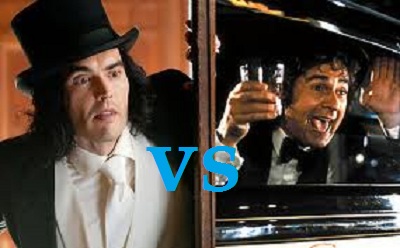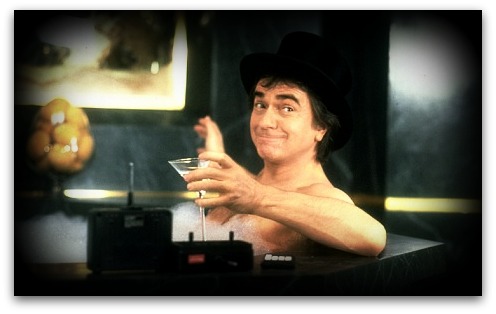REMAKE VS. REBOOT
Remakes are nothing new. From the silent era onward, filmmakers have returned again and again to the same stories, re-interpreting them and updating them either for the sake of modernization, to expose them to a broader audience or to just make more money. We modern film geeks tend to roll our eyes and groan cynically when a new remake comes down the pike, but the fact of the matter is that when done right there are few things as satisfying as a seeing a story we love get a good cinematic spit-shine. Remakes are a part of the grand tradition of storytelling and cinema history, and love them or hate them, they’re here to stay.
But in the last decade, the term “remake” has become something of a dirty word, and as a result Hollywood spin doctors and internet journalists have given us the new terms “reboot” and “re-imagining”. Do these terms actually have meaning, or are they just empty buzzwords? The mission statement of this ongoing column will be to answer that question by comparing an original film to a re-do and determining if the newer version fits one of the following definitions:
Remake: A straight re-telling of a story for the purpose of updating it for a contemporary audience, or making it accessible to a different culture or region.
Reboot: A course correction done with the purpose of restarting a franchise. A reset. Fealty to the original story or film is not a priority.
Re-Imagining: A re-telling of a story, but only in the broadest sense. Characters and some story elements may be retained, but mostly plot and story have been repurposed.
I also will make a judgment call on which version is superior. Some controversy may ensue.

ARTHUR (1981) VS. ARTHUR (2011)
The story: Arthur, a drunken millionaire playboy lives a life of mirthful abandon, womanizing and tarnishing his high-toned legacy with his good-naturedly reckless antics. His fortune is put into jeopardy when he is forced into an engagement with Susan, a woman his family feels is well suited for him in terms of ambition and breeding, but with whom Arthur is not in love with. Matters are complicated when Arthur falls for a free-spirited but lower class girl, despite the protests of his elderly caretaker and confidant, Hobson. When Hobson falls gravely ill, Arthur is forced to grow up, and in doing so takes control of his life and risks it all for the woman he truly loves.
So what’s the deal?: 1981’s Arthur is thought of as a minor classic, so when a remake starring “rockstar” comedian Russell Brand was announced, some small umbrage was expressed by, uh, “fans”. I personally thought that on paper, it sounded like an OK fit. On a good day Russell Brand has a similar goofy but slightly cool British guy vibe that Dudley Moore had in his heyday. And when it was announced that sexy grandma Helen Mirren would be the new Hobson, a role formerly inhabited by Shakespearean superstar John Geilgud, I couldn’t help but be intrigued. Promotional pics of Brand dressed in the Batman Forever batsuit almost had me wanting to catch this in the theater. Almost. Then the reviews started filtering in and they were dreadful. And having seen the 2011 version now, I have to say that “dreadful” really fails to cover it.
Now I’m not the world’s biggest fan of the original Arthur or anything. I like it, mostly for sex-God Christopher Cross’s iconic theme song, but I think Moore’s performance is sometimes shrill and too over the top. He spends the first fifteen minutes pratfalling and laughing hysterically, and while in 1981 it may have read as “wacky drunk guy”, today it comes off forced, cliché,and well, annoying. It’s a vaudevillian portrayal of a drunk, and while Moore’s undeniable charm ultimately sells it, it’s not like it couldn’t be done differently or better. It certainly couldn’t be done the same way for modern audiences, and to Russell Brand’s credit, he doesn’t attempt an imitation of Moore’s Arthur. Unfortunately, what he does isn’t good either. He plays Arthur as a mincing, girlish creep, which is another way of saying that he plays him as Russell Brand. And you know what? It sucks.
So Brand’s mincing, girlish creepiness didn’t work for me here but I can’t lay the blame for the debacle of 2011’s Arthur entirely at his feet. There is something just off about the whole movie. It has a desperate, awkward quality; it wants so badly to make you laugh but it is so stilted and poorly timed that it gives you that feeling of embarrassment you get when watching a comedian bomb onstage. Jokes fall flat, scenes have no timing in the edits – it almost seems like the work of a total amateur. I don’t know who the hell the director Jason Winer is, but he should stay far, far away from comedy in the future. At least comedy feature films, because if his work on Arthur 2011is any evidence, he has no idea as to what he’s doing.
It doesn’t help that the central romance that drives the whole goddamn movie is such a resounding dud. Now I don’t know many people who feel anything but revulsion towards the original film’s pairing of Moore and Liza (ulp) Minelli as the star-crossed lovers, but at least they seemed to have some sort of tangible rapport. Brand is paired with indie darling Greta Gerwig, and I have to say, Gerwig delivers what has to be the most unconvincing performance in a major motion picture this year. Gerwig seems totally lost, as if she has no idea what she is doing here, and if her and Brand shared even a glimmer of real attraction towards one another in real life I will eat one of Luiz Guzman’s gym sneakers. She is truly awful in the film, which is really too bad because I have seen Gerwig deliver a charming performance elsewhere. But here she just seems completely bewildered or on some sort of medication. It’s like she’s channeling Zooey Deschanel’s performance from The Happening or some shit. The irony is that Jennifer Garner is cast in the “villain” role as the somehow undesirable Susan, yet Garner shows infinitely more charm in scenes where you’re supposed to hate her. That’s how completely off this whole thing is.
This lack of charm infects the whole movie like a horrible virus. In my opinion, what the original Arthur really has going for it is charm, so when you take that away you are left with a sappy piece of tripe with no real redeeming qualities. Worst of all, the Arthur remake makes the terminal mistake of having Brand’s Arthur end up a repentant drunk! The great thing about Dudley Moore’s Arthur is that he never actually repents for his boozing. Sure, he sobers up for the sake of nursemaiding Hobson, but as credits roll Arthur is still a drinker. The new Arthur is forced in to join Alcoholics friggin’ Anonymous in order to win back the dazed, glassy-eyed object of his affections. It’s this sort of annoying, moralistic thuggery that ruins comedy. No one wants to see a repentant drunk in a comedy, and certainly no one wants to see a clean and sober Arthur! And if you do, I don’t want to hang out with you at a party. Or probably at all.
As for the remake, reboot, re-imagining question – it’s barely worth getting into. This is the most remakey remake that was ever remade. It is literally, scene-by-scene, almost the exact same movie as the original. Some minor details are changed but you won’t even notice them. Even Hobson’s sex change and Mirren’s strong performance can’t make a difference. They literally dusted off the 81’ script, took out all the good jokes, replaced them with terrible ones and let Russell Brand do his thing. It is exactly what you don’t want a remake to be — a subtractive, redundant stillborn that was clearly motivated by nothing other than greed. Thankfully it was a horrendous bomb and we will not be subjected to Russell Brand’s Arthur 2: On the Rocks.
Verdict: Remake.

Which version is better?: Don’t even. I don’t think that 1981’s Arthur holds up that well, but 2011’s version is suicide-inducing.
Up Next: Batman vs. The Dark Knight.